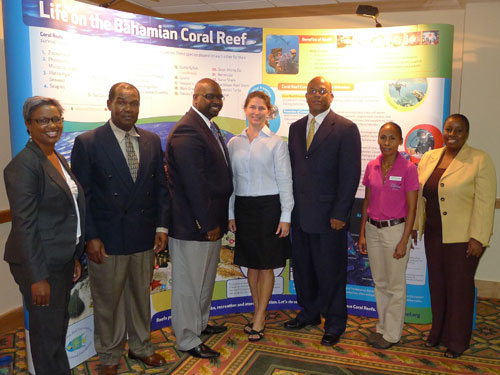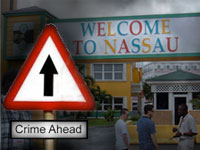 A locally made and funded film is expected to reach over 800 high school Biology students and teachers from 20 schools in New Providence, and an additional 350 students and teachers in schools in several of the family islands through 2013. The next stop for BREEF’s Virtual Coral Reef Field Trip will be Andros next week. Andros is home to the third longest barrier reef in the world.
A locally made and funded film is expected to reach over 800 high school Biology students and teachers from 20 schools in New Providence, and an additional 350 students and teachers in schools in several of the family islands through 2013. The next stop for BREEF’s Virtual Coral Reef Field Trip will be Andros next week. Andros is home to the third longest barrier reef in the world.
With funding from the Kerzner Marine Foundation’s Blue Project, the Bahamas Reef Environment Educational Foundation (BREEF) officially released its new educational film titled “Life on the Bahamian Coral Reef” during their Virtual Coral Reef Field Trip Workshop for students and teachers. The event was held at the Atlantis Resort on Paradise Island and follows international celebrations of the World Science Day for Peace & Development. World Science Day helps to show the general public why science is relevant to their daily lives and engage them in discussion on related issues. This locally-produced film and its accompanying learning resources showcases the biodiversity of our Bahamian coral reefs, its importance to our culture and economy, and is a tool to sustain discussion on how to use our marine resources in a responsible way.
Minister of the Environment and Housing Kenred Dorsett launched BREEF’s Virtual Coral Reef Field Trip project, along with Parliamentary Secretary in the Ministry of Agriculture, Fisheries and Local Government and MP for Exuma Hon. Anthony Moss and Assistant Director of Education Mr. Hamblin Newbold. Minister Dorsett reiterated the Government’s commitment to the Caribbean Challenge, which will protect 20% of the nearshore environment of The Bahamas by 2020. He welcomed BREEF’s Virtual Coral Reef Field Trip project as an important tool for environmental education and encouraged students to be “Ambassadors now” for the protection of the environment. “I believe that there should be a symbiotic relationship with man and the marine environment. The more we protect it, the more it will give to us for decades and generations to come, enhancing our way of life”.
The film is part of a Virtual Coral Reef Field Trip Multimedia Toolkit for Schools which was developed by BREEF as a result of direct requests from teachers for an educational resource that would assist them with overcoming the challenges they face in taking students out to observe a real coral reef. The film and other resources will bring the reef into the classroom and will also lay the groundwork for further field study in Biology.
The toolkit consists of the DVD film “Life on the Bahamian Coral Reef” including interactive film extras on Reef Creature ID, Reef Fish ID and a Reef Survey Simulation, a Bahamian coral reef poster, a 20-page Educator’s Guide. All teachers and schools also receive a series of marine organism life cycle posters donated by The Nature Conservancy. Toolkits will be provided to all Biology teachers in public and private schools throughout The Bahamas. This will enable them to replicate the workshop in their classrooms and in this way reach every 10th grade student in the country, and all biology teachers.
In 2011, BREEF distributed the film “Take Care of the Coral Reefs”, with its accompanying Teacher’s Guide, to primary schools throughout the country. BREEF also continues to partner with Stuart Cove’s and schools to provide students of all ages the opportunity to snorkel on our coral reefs.
According to NOAA, about 75% of the world’s coral reefs are threatened and if left unchecked this percentage is expected to increase to 90% by 2030. Whilst reefs can usually rebound from natural threats such as predation, storms and disease, human-induced threats are proving far more detrimental. Such threats include overfishing, pollution, habitat destruction (e.g. due to coastal development), invasive species and anthropogenic climate change.
Although coral reefs cover less than 1% of the seafloor globally, they contain 25% of all marine species in the world’s oceans, including most commercial marine species in The Bahamas. In addition to providing employment and revenue through our local fisheries and tourism sectors, healthy coral reefs also contribute to our local food security, help reduce coastal erosion, replenish sand on our beaches and are enjoyed recreationally by residents. The Bahamas is one of the countries in the world most dependent on our coral reefs for these important ecosystem services.
BREEF thanks the following organizations and individuals for their support of this project: The Kerzner Marine Foundation as the lead funding agency; Atlantis for providing the workshop venue; Community Conch, Khaled bin Sultan Living Oceans Foundation, Pew Charitable Trusts, Bahamas National Trust, REEF/Grouper Moon Project, Stuart Cove’s Dive Bahamas for the film footage; Kevin Turnquest & Vaudio Productions – film producers, The Nature Conservancy, Bahamas Telecommunications Corporation (BTC) and many BREEF supporters who have provided us with information and photographs.
If you would like to help BREEF extend this valuable learning experience to students and teachers on more of our family islands or with its other programmes, please contact Casuarina McKinney-Lambert at 327-9000 or casuarina@breef.org.
BREEF is a non-government, non-profit, Bahamian foundation whose mission is to promote a sustainable relationship between Bahamians, visitors and our marine environment. We aim to bridge gaps between science research, public education and policy to inspire action for the conservation of marine resources that help to sustain our way of life.
The attached image is the “Life on the Bahamian Coral Reef” poster produced by BREEF as a component of the Virtual Coral Reef Field Trip. Copies of the full sized poster are available from BREEF.



